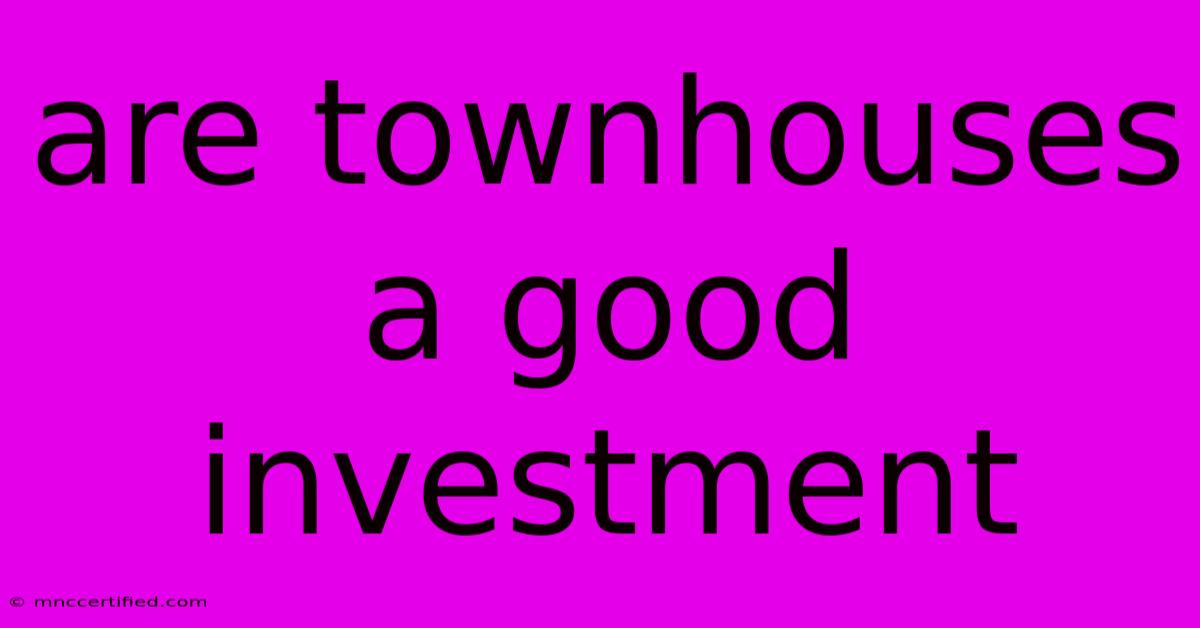Are Townhouses A Good Investment

Table of Contents
Are Townhouses a Good Investment? A Comprehensive Guide
Townhouses offer a compelling blend of single-family home living and the conveniences of condo living. But are they a good investment? The answer, like most real estate questions, is nuanced and depends on various factors. This comprehensive guide will delve into the pros and cons of townhouse investments to help you make an informed decision.
The Allure of Townhouse Investments: Weighing the Pros
Townhouses present several attractive features for investors:
1. Affordability & Accessibility: A Stepping Stone to Homeownership
Compared to detached single-family homes, townhouses often come with a lower price tag, making them more accessible to first-time buyers and investors with smaller budgets. This affordability is a significant draw, allowing investors to enter the market sooner and potentially build equity faster. This is especially relevant in competitive markets where detached homes are significantly more expensive.
2. Lower Maintenance & Shared Responsibilities: More Free Time, Less Hassle
One of the biggest advantages of townhouse living is the reduced maintenance burden. Exterior upkeep, landscaping, and snow removal are often handled by a homeowners' association (HOA), freeing up your time and reducing your responsibilities. This translates to lower ongoing costs and less stress for the homeowner or investor.
2. Amenities & Community Features: Enhanced Lifestyle & Value
Many townhouse communities offer attractive amenities like swimming pools, fitness centers, and playgrounds, adding value to the property and enhancing the lifestyle for residents. These community features can be a significant selling point for potential buyers, increasing your return on investment (ROI).
3. Strong Rental Potential: Consistent Cash Flow
Townhouses often command strong rental rates, making them attractive income-generating properties. Their smaller size and lower maintenance requirements can lead to higher rental yields compared to larger single-family homes, offering investors a steady stream of passive income. This is particularly true in areas with high demand for rental properties.
Potential Downsides: Navigating the Cons of Townhouse Ownership
While townhouses offer numerous benefits, it's crucial to acknowledge potential drawbacks:
1. HOA Fees: A Recurring Cost to Consider
HOA fees are a significant factor to consider. These fees cover maintenance, amenities, and community upkeep. While they reduce your individual maintenance responsibilities, they represent a recurring monthly expense that can impact your overall profitability. Carefully examine the HOA’s financial stability and reserve funds before investing.
2. Limited Customization & Control: Restrictions on Renovations
Townhouses often come with restrictions on exterior modifications and renovations. This can limit your ability to customize the property to increase its value or appeal to potential buyers or renters. Always review the HOA guidelines meticulously before purchasing.
3. Shared Walls & Noise Concerns: Proximity to Neighbors
Living in close proximity to neighbors means you'll share walls. This can lead to noise concerns, particularly if your neighbors are inconsiderate. While not always a deal-breaker, it's a factor to consider, especially for investors renting to tenants.
4. Resale Value & Market Trends: Location, Location, Location
The resale value of a townhouse is subject to market fluctuations. Location plays a critical role in determining resale value. A desirable location in a well-maintained community will generally command higher prices than a less desirable location. Thorough market research is essential before investing.
Making the Investment Decision: A Strategic Approach
Ultimately, the question of whether townhouses are a good investment depends on your individual circumstances, financial goals, and risk tolerance. Consider these factors:
- Your Investment Goals: Are you looking for long-term appreciation, rental income, or a combination of both?
- Market Analysis: Thoroughly research the local real estate market, focusing on comparable properties, rental rates, and HOA fees.
- Financial Projections: Create a detailed financial model to assess the potential return on investment, factoring in all expenses, including HOA fees, taxes, insurance, and maintenance.
- Due Diligence: Conduct a comprehensive inspection of the property and review the HOA documents meticulously.
By carefully weighing the pros and cons and conducting thorough research, you can determine if investing in townhouses aligns with your investment strategy and financial objectives. Remember, a well-informed decision is the cornerstone of a successful real estate investment.

Thank you for visiting our website wich cover about Are Townhouses A Good Investment. We hope the information provided has been useful to you. Feel free to contact us if you have any questions or need further assistance. See you next time and dont miss to bookmark.
Featured Posts
-
Israel Pm Faces Icc Arrest Warrant
Nov 22, 2024
-
Putin Confirms Russias Missile Strike On Ukraine
Nov 22, 2024
-
Great Lakes Insurance Batavia Ny
Nov 22, 2024
-
International Reaction Icc Charges Against Netanyahu
Nov 22, 2024
-
Intercare Insurance Workers Comp
Nov 22, 2024